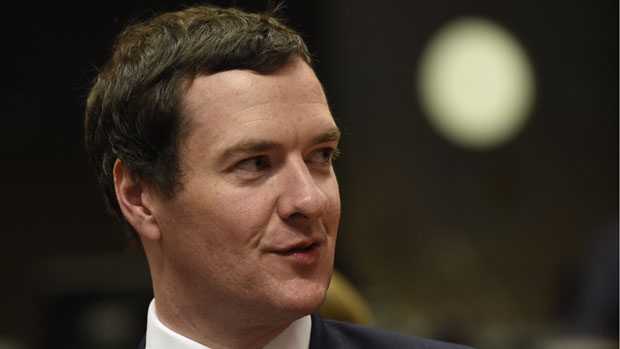Incomes ‘milestone’: a Champagne or Cava moment?
Chancellor hails incomes breakthrough but John Humphrys draws attention to ‘the small print’

A free daily email with the biggest news stories of the day – and the best features from TheWeek.com
You are now subscribed
Your newsletter sign-up was successful
George Osborne this morning greeted the news about average UK living standards returning to pre-2008 levels as further proof that the sensible thing to do on 7 May is to vote Conservative.
"We have reached a major milestone today in the British recovery,” he told Radio 4’s Today programme. "But it is not the end of the journey. We've got to secure a truly national recovery and we mustn't put the progress we have made at risk by abandoning the plan that has got us this far."
For “abandoning the plan” read “voting Labour”.
The Week
Escape your echo chamber. Get the facts behind the news, plus analysis from multiple perspectives.

Sign up for The Week's Free Newsletters
From our morning news briefing to a weekly Good News Newsletter, get the best of The Week delivered directly to your inbox.
From our morning news briefing to a weekly Good News Newsletter, get the best of The Week delivered directly to your inbox.
Interviewing the Chancellor, John Humphrys opened by saying “Happy days are here again!” – apparently bringing a broad grin from the Osborne - before adding: “Or, you can read the small print…”
Was it, Humphrys wondered, a moment for breaking out the Champagne – or would “a cheaper Cava” be a wiser option?
The most damning projection released by the Institute for Fiscal Studies (IFS), an independent think-tank, is that most working age adults - especially younger ones – remain worse off.
Incomes for the age group 22 to 30 are projected to be 7.6 per cent lower than they were in 2007-08, while for the 31 to 59 age group incomes are still 2.5 per cent lower. The winners are the over-60s, who are 1.8 per cent better off.
A free daily email with the biggest news stories of the day – and the best features from TheWeek.com
Also, the recovery has been incredibly slow. IFS director Paul Johnson told Today: "It is astonishing that seven years later incomes are still no higher than they were pre-recession and, indeed, in working-age households they are still a bit below where they were pre-recession."
Osborne admitted that “the poorest in society and the young in society suffer most when the economy fails”, but he was more interested in the three myths laid to rest by the IFS.
One, average incomes are up on 2007-08 which means the country is richer than it was, not poorer.
Two, the richest are paying the most towards dealing with Britain’s economic problems – not the least, “as you often hear”.
Three, inequality in society has fallen not risen.
In short, Osborne claimed, Britain is “fundamentally in a better position than it was five years ago”.
-
 Companies are increasingly AI washing
Companies are increasingly AI washingThe explainer Imaginary technology is taking jobs
-
 The 9 best steroid-free players who should be in the Baseball Hall of Fame
The 9 best steroid-free players who should be in the Baseball Hall of Famein depth These athletes’ exploits were both real and spectacular
-
 ‘Bad Bunny’s music feels inclusive and exclusive at the same time’
‘Bad Bunny’s music feels inclusive and exclusive at the same time’Instant Opinion Opinion, comment and editorials of the day
-
 The high street: Britain’s next political battleground?
The high street: Britain’s next political battleground?In the Spotlight Mass closure of shops and influx of organised crime are fuelling voter anger, and offer an opening for Reform UK
-
 Is a Reform-Tory pact becoming more likely?
Is a Reform-Tory pact becoming more likely?Today’s Big Question Nigel Farage’s party is ahead in the polls but still falls well short of a Commons majority, while Conservatives are still losing MPs to Reform
-
 Taking the low road: why the SNP is still standing strong
Taking the low road: why the SNP is still standing strongTalking Point Party is on track for a fifth consecutive victory in May’s Holyrood election, despite controversies and plummeting support
-
 What difference will the 'historic' UK-Germany treaty make?
What difference will the 'historic' UK-Germany treaty make?Today's Big Question Europe's two biggest economies sign first treaty since WWII, underscoring 'triangle alliance' with France amid growing Russian threat and US distance
-
 Is the G7 still relevant?
Is the G7 still relevant?Talking Point Donald Trump's early departure cast a shadow over this week's meeting of the world's major democracies
-
 Angela Rayner: Labour's next leader?
Angela Rayner: Labour's next leader?Today's Big Question A leaked memo has sparked speculation that the deputy PM is positioning herself as the left-of-centre alternative to Keir Starmer
-
 Is Starmer's plan to send migrants overseas Rwanda 2.0?
Is Starmer's plan to send migrants overseas Rwanda 2.0?Today's Big Question Failed asylum seekers could be removed to Balkan nations under new government plans
-
 Has Starmer put Britain back on the world stage?
Has Starmer put Britain back on the world stage?Talking Point UK takes leading role in Europe on Ukraine and Starmer praised as credible 'bridge' with the US under Trump